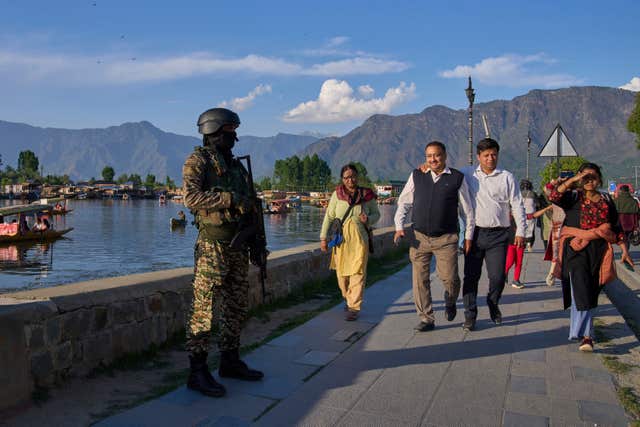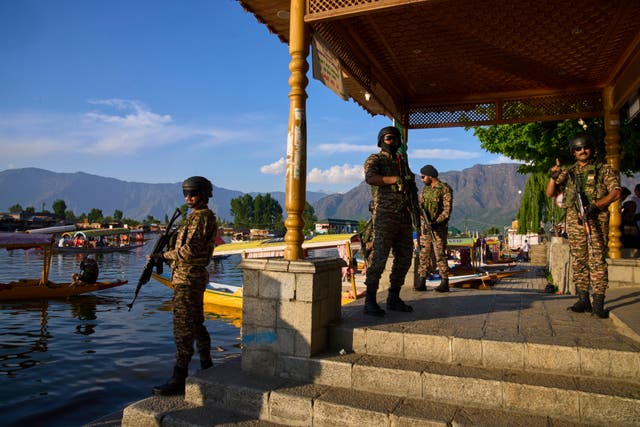Pakistani troops fire on soldiers along Kashmir frontier, says Indian military
The Indian army said in a statement that soldiers from multiple Pakistani army posts overnight opened fire.

Pakistani soldiers fired at Indian posts all along the highly militarised frontier in disputed Kashmir for a second consecutive night, the Indian military said on Saturday.
Tensions have continued to escalate between nuclear-armed rivals following a deadly attack on tourists.
The Indian army said in a statement on Saturday that soldiers from multiple Pakistani army posts overnight opened fire at Indian troops “all across the Line of Control” in Kashmir.

“Indian troops responded appropriately with small arms,” the statement said, calling the firing “unprovoked”.
There were no casualties reported, the statement added.
On Friday, the Indian army said Pakistani soldiers had fired at an Indian post in the Gurez sector with small arms late the previous night.
There was no immediate comment from Pakistan, and the incidents could not be independently verified.
In the past, each side has accused the other of starting border skirmishes in the Himalayan region, which both claim in its entirety.
An uneasy calm prevailed in Pakistan-administered Kashmir on Saturday.
Markets and bazaars were open and there was no sign of evacuations from villages located near the Line of Control.
India has described the massacre in which gunmen killed 26 people, most of them Indian, as a “terror attack” and accused Pakistan of backing it.
Pakistan denied any connection to the attack near the resort town of Pahalgam in India-controlled Kashmir, and the attack was claimed by a previously unknown militant group calling itself the Kashmir Resistance.

Tuesday’s attack in Kashmir was the restive region’s worst assault targeting civilians in years.
In the days since, tensions have risen dangerously between India and Pakistan, which have fought two of their three wars over Kashmir, which is split between them and claimed by both in its entirety.
On Wednesday, India suspended a crucial water-sharing treaty that has withstood two wars between the countries and closed their only functional land border crossing.
A day later, India revoked all visas issued to Pakistani nationals with effect from Sunday.
Pakistan responded angrily that it had nothing to do with the attack, and cancelled visas issued to Indian nationals, closed its airspace to all Indian-owned or Indian-operated airlines, and suspended all trade with India.
Nationals from both sides began heading back to their home countries through the Wagah border near Pakistan’s eastern city of Lahore on Friday.
Islamabad also warned that any Indian attempt to stop or divert the flow of water would be considered an “act of war”.
The suspension of the water treaty could lead to water shortages at a time when parts of Pakistan are already struggling with drought and declining rainfall.
“Pakistan is fully prepared to confront any Indian aggression,” the country’s information minister Attaullah Tarar said in a televised statement on Friday.
New Delhi describes all militancy in Kashmir as Pakistan-backed terrorism. Pakistan denies this, and many Muslim Kashmiris consider the militants to be part of a home-grown freedom struggle.
With tensions high between the two countries, Iran offered mediation, while US President Donald Trump said he expected them to work out their differences.
“Tehran stands ready to use its good offices in Islamabad and New Delhi to forge greater understanding at this difficult time,” Iranian foreign minister Syed Abbas Araghchi said on Friday.
“India and Pakistan are brotherly neighbours of Iran, enjoying relations rooted in centuries-old cultural and civilisational ties. Like other neighbours, we consider them our foremost priority,” Mr Araghchi wrote in a social media post.
Mr Trump on Friday said “there’s great tension between Pakistan and India, but there always has been”.
The US president, who spoke on board Air Force One, did not answer when asked by reporters whether he would contact leaders of the two countries, but said “they’ll get it figured out one way or the other”.
The US has long called for calm between India and Pakistan, and mediated between the two rivals during a major border skirmish in 1999.
US intelligence chief Tulsi Gabbard expressed solidarity with India.
“We are with you and support you as you hunt down those responsible for this heinous attack,” Ms Gabbard said in a post on social media platform X.
On Friday, Pakistan’s Foreign Ministry said senior diplomats from Saudi Arabia and Iran had spoken to Pakistan’s deputy prime minister Ishaq Dar to discuss the ongoing regional situation.
India has already briefed the envoys of all G20 countries and Gulf nations, apprising them of the incident and steps taken by New Delhi.





